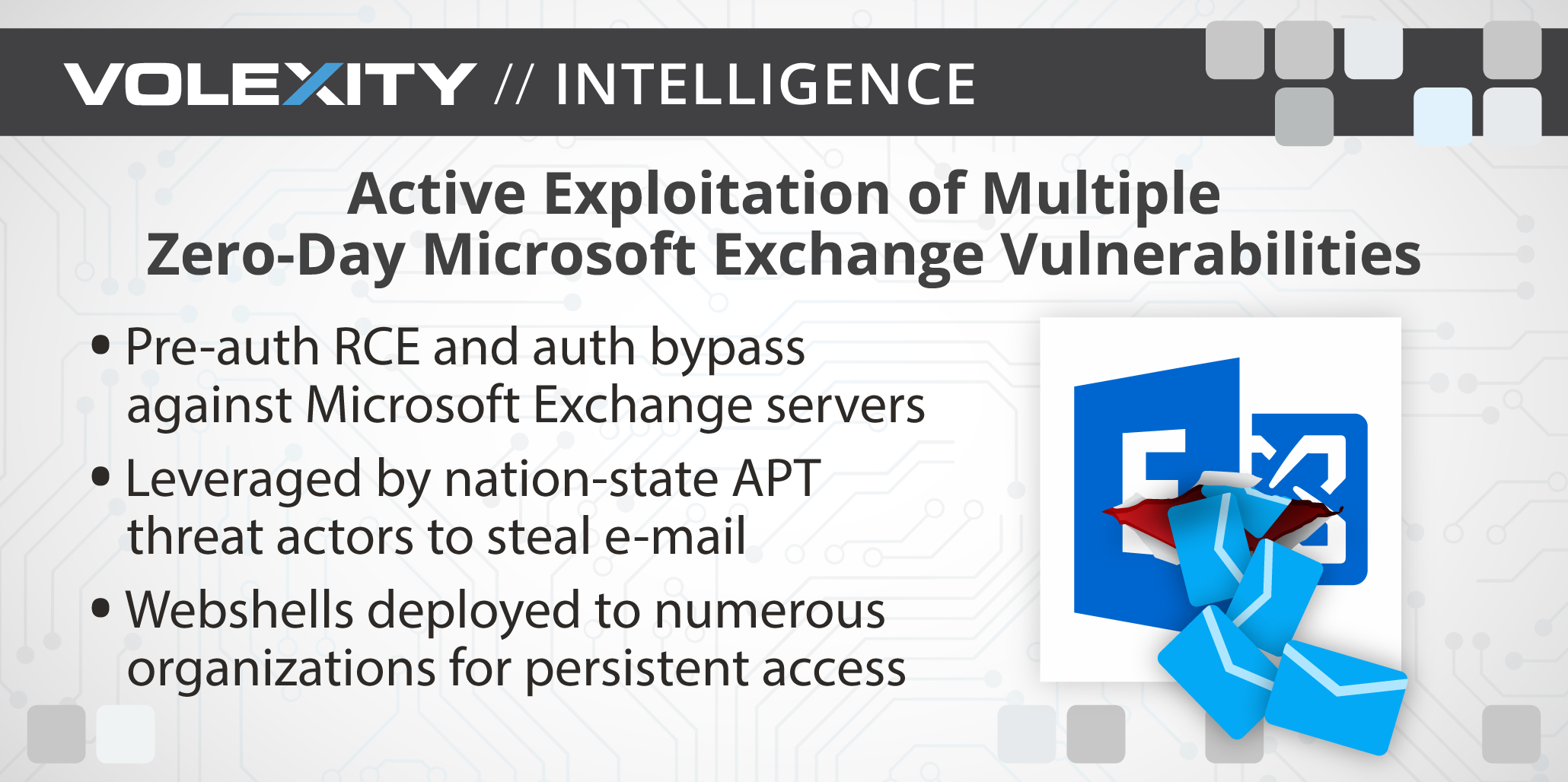Microsoft Exchange Worker Spawning Suspicious Processes
Identifies suspicious processes being spawned by the Microsoft Exchange Server worker process (w3wp). This activity may indicate exploitation activity or access to an existing web shell backdoor.
Elastic rule (View on GitHub)
1[metadata]
2creation_date = "2021/03/08"
3integration = ["endpoint", "windows"]
4maturity = "production"
5updated_date = "2024/05/21"
6
7[rule]
8author = ["Elastic"]
9description = """
10Identifies suspicious processes being spawned by the Microsoft Exchange Server worker process (w3wp). This activity may
11indicate exploitation activity or access to an existing web shell backdoor.
12"""
13from = "now-9m"
14index = ["logs-endpoint.events.process-*", "winlogbeat-*", "logs-windows.sysmon_operational-*", "endgame-*"]
15language = "eql"
16license = "Elastic License v2"
17name = "Microsoft Exchange Worker Spawning Suspicious Processes"
18references = [
19 "https://www.microsoft.com/security/blog/2021/03/02/hafnium-targeting-exchange-servers",
20 "https://www.volexity.com/blog/2021/03/02/active-exploitation-of-microsoft-exchange-zero-day-vulnerabilities",
21 "https://discuss.elastic.co/t/detection-and-response-for-hafnium-activity/266289",
22]
23risk_score = 73
24rule_id = "f81ee52c-297e-46d9-9205-07e66931df26"
25setup = """## Setup
26
27If enabling an EQL rule on a non-elastic-agent index (such as beats) for versions <8.2,
28events will not define `event.ingested` and default fallback for EQL rules was not added until version 8.2.
29Hence for this rule to work effectively, users will need to add a custom ingest pipeline to populate
30`event.ingested` to @timestamp.
31For more details on adding a custom ingest pipeline refer - https://www.elastic.co/guide/en/fleet/current/data-streams-pipeline-tutorial.html
32"""
33severity = "high"
34tags = [
35 "Domain: Endpoint",
36 "OS: Windows",
37 "Use Case: Threat Detection",
38 "Tactic: Initial Access",
39 "Tactic: Execution",
40 "Data Source: Elastic Endgame",
41 "Data Source: Elastic Defend",
42 "Data Source: Sysmon",
43]
44timestamp_override = "event.ingested"
45type = "eql"
46
47query = '''
48process where host.os.type == "windows" and event.type == "start" and
49 process.parent.name : "w3wp.exe" and process.parent.args : "MSExchange*AppPool" and
50 (process.name : ("cmd.exe", "powershell.exe", "pwsh.exe", "powershell_ise.exe") or
51 ?process.pe.original_file_name in ("cmd.exe", "powershell.exe", "pwsh.dll", "powershell_ise.exe"))
52'''
53
54
55[[rule.threat]]
56framework = "MITRE ATT&CK"
57[[rule.threat.technique]]
58id = "T1190"
59name = "Exploit Public-Facing Application"
60reference = "https://attack.mitre.org/techniques/T1190/"
61
62
63[rule.threat.tactic]
64id = "TA0001"
65name = "Initial Access"
66reference = "https://attack.mitre.org/tactics/TA0001/"
67[[rule.threat]]
68framework = "MITRE ATT&CK"
69[[rule.threat.technique]]
70id = "T1059"
71name = "Command and Scripting Interpreter"
72reference = "https://attack.mitre.org/techniques/T1059/"
73[[rule.threat.technique.subtechnique]]
74id = "T1059.001"
75name = "PowerShell"
76reference = "https://attack.mitre.org/techniques/T1059/001/"
77
78[[rule.threat.technique.subtechnique]]
79id = "T1059.003"
80name = "Windows Command Shell"
81reference = "https://attack.mitre.org/techniques/T1059/003/"
82
83
84
85[rule.threat.tactic]
86id = "TA0002"
87name = "Execution"
88reference = "https://attack.mitre.org/tactics/TA0002/"
References
Related rules
- ScreenConnect Server Spawning Suspicious Processes
- Suspicious Explorer Child Process
- Unusual Execution via Microsoft Common Console File
- Windows Script Executing PowerShell
- Windows Script Interpreter Executing Process via WMI

